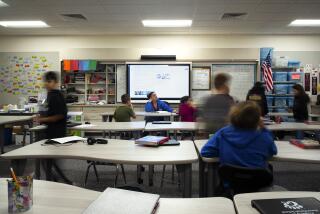NONFICTION - Nov. 15, 1992
- Share via
CROSSING THE TRACKS: How ‘Untracking’ Can Save America’s Schools by Anne Wheelock (The New Press: $19.95; 311 pp.). Tracking--policy analyst Anne Wheelock calls it, woodenly, “the categorizing of students according to particular measures of intelligence into distinct groups for purposes of teaching and learning”--seemed a good idea not so many years ago. What better way to educate a child than by tailoring a curriculum to his or her abilities? Well, so much for theory: It’s clear, now, that few measures of ability are culturally and racially neutral, and that the students who are most likely to succeed on their own--that is, those deemed most “able”--receive the best education. “Crossing the Tracks” is less a description of the untracking process than a training manual, but it gets across the major whys and hows of untracking: the benefits of heterogenous classrooms, peer-instruction, teamwork and real-world-based learning, and the problems posed by parental resistance, teacher inertia and fears of “dumbing down.” Wheelock makes the untracking of tracked education seem a daunting but essential task, not least because untracked learning necessarily turns the classroom into a microcosm of the culture in which children must make their way. As one student is quoted as saying about a year spent in a newly untracked school, “Having everyone all mixed up in classes makes me feel part of the whole group, not just with my own few friends.”
More to Read
Sign up for our Book Club newsletter
Get the latest news, events and more from the Los Angeles Times Book Club, and help us get L.A. reading and talking.
You may occasionally receive promotional content from the Los Angeles Times.








